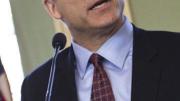“Somewhat more than half” the students investigated for academic misconduct on a spring 2012 final exam were “required…to withdraw from the College for a period of time,” according to a message to faculty, staff, and students e-mailed by Faculty of Arts and Sciences (FAS) dean Michael D. Smith on February 1. As reported last August, nearly half the students in the course, which had a reported enrollment of 279, were investigated by the Administrative Board for inappropriate collaboration on the take-home final examination. Smith’s February update indicated that of those whose work was reviewed, more than half were required to withdraw (typically, for two to four terms, according to Ad Board regulations); of the remainder, “roughly half” were put on disciplinary probation; and the remaining cases resulted in “no disciplinary action.”
“Let me be crystal clear,” Smith wrote of efforts to clarify and secure adherence to standards of academic integrity: “we all can do better.”
Doing so, the dean suggested, could begin with faculty discussion of recommendations forthcoming from the Committee on Academic Integrity, chaired by dean of undergraduate education Jay M. Harris. That committee has pursued “student-facing” and “faculty-facing” initiatives. The former might include “the adoption of some form of an honor code to guide students,” and the latter, possibly, “recommendations regarding best practices for properly structured and administered assessments of student competency,” along with already-instituted exhortations to professors to clarify what sorts of student collaboration on work are permitted. FAS members were scheduled to hear some preliminary findings from Harris at the faculty’s February 5 meeting.
The Ad Board proceeding, focused on student conduct, did not engage those “faculty-facing” issues—such as the expectations course leaders establish for students, the structure and conduct of exams, or other pedagogical challenges. Given the enormous effort involved in hearing this large volume of individual cases, and resolving ambiguities about who said and shared what with whom when, it is also too soon to expect reflection on whether the Ad Board process itself is up to resolving such involved, complex investigations in a timely manner. (Because the final cases were not resolved until just before the Christmas holiday, students required to withdraw were treated as though they had done so by September 30, lessening their financial obligation for fall-term tuition, room, and board fees.) Wider discussion of such problems—essentially absent during the Ad Board hearings last term—awaits faculty and student engagement now.
For a fuller report on the Administrative Board proceedings and Dean Smith’s message (including the full text of his e-mail and links to earlier reports on the cheating investigation), see https://harvardmag.com/cheating-13.








